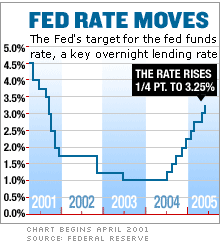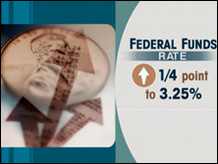 |
|
|
|
|
|
|
| More about the Fed and economy
|
|
|
|
|
|
|
|
|

|
| The Federal Reserve raised its target for a key short-term interest rate by a quarter-point. CNN's Susan Lisovicz reports. (June 30) |
Play video
|
|
|
|
NEW YORK (CNN/Money) -
The Federal Reserve raised interest rates by a quarter point for the ninth straight time Thursday, a year to the day after its first rate hike, and gave no indication it was through in its campaign to ward off inflation.
In its closely watched statement, the central bank said it would probably keep increasing rates at a "measured" pace. That word, used in every Fed statement since May 2004, means another quarter-point hike is likely when Chairman Alan Greenspan and other Fed policy makers meet again on August 9.
Thursday's quarter-point increase brings the federal funds rate, an overnight bank lending rate, to 3.25 percent, the highest level since shortly before the September 2001 terrorist attacks, up from 1 percent a year ago.
But economists say the Fed now faces a tough challenge. Greenspan and other Fed governors are clearly worried about a possible "bubble" in the real estate market, and some analysts think the central bank will need to keep raising rates to keep that market from overheating.
If it does keep raising rates, however, that could end up hurting economic growth.
To that end, recent signs of weakness in the manufacturing sector and oil prices hovering near record highs have raised some concerns about a looming economic slowdown. Bond guru Bill Gross, who runs the world's largest fixed-income mutual fund, even suggested last week that the Fed may need to lower rates by the end of the year.
That's a minority view, to be sure. But after Thursday's announcement, some economists said the Fed should at least pause in August to make sure that it doesn't risk hurting the economy, especially since long-term bond rates remain relatively low.
"Given the extent of what economic growth could be in the second quarter and the deceleration in inflation, I wouldn't anticipate many more rate hikes," said Kathleen Camilli, president of Camilli Economics, an independent research firm. She thinks the Fed will raise rates in August to 3.5 percent and then pause to assess the impact its rate hikes have had on the economy.
But other analysts said the Fed sent a strong signal that it's not done raising rates just yet. To wit, the Fed acknowledged in its statement that energy prices have risen since its last meeting in May but also said that despite this rise, "the expansion remains firm and labor market conditions continue to improve gradually."
"I fully expect that when the Fed decides to put an end to rate hikes they will give us notice," said David Kelly, economic advisor with Putnam Investments in Boston. "It's clear they think the economy is healthy." Kelly thinks the Fed will keep raising until the fed funds rate hits at least 4 percent. That would be quarter-point hikes at each of the next three meetings.
The central bank also noted that "pressures on inflation have stayed elevated, but longer-term inflation expectations remain well contained."
This comment took some analysts by surprise, since the latest reports on consumer and producer prices have indicated that inflation is relatively benign.
So that could be a reason why the major stock indexes, little changed before the announcement, edged lower afterward.
"What struck me as a little out of character was the Fed's characterization of inflation staying elevated," said Keith Hembre, chief economist with First American Funds in Minneapolis. "What was here was a clear absence of any sort of signal that the Fed is getting close to the end of tightening and the market seems to be reacting a bit negatively to that."
But Treasury bond prices rallied after the Fed statement, leaving the yield on the benchmark 10-year Treasury at about 3.92 percent, down from 3.98 percent earlier. Bond yields and prices move in opposite directions.
Typically, a decline in long-term yields is a signal that bond investors are betting on a slowing economy. Some even fear that a further pullback in long-term rates raises the risk of what is known as an "inverted yield curve", a condition when short-term rates are higher than long-term rates. This has tended to be an accurate historical predictor of recessions.
Putnam's Kelly said he's not concerned about an inverted yield curve. First, he said, long-term rates will eventually head higher. But even if they don't, the rally in bonds is merely a sign that many investors, especially foreign central banks, are still willing to buy Treasuries, which are perceived to be safer bets than corporate bonds and international fixed-income securities.
Still, the fact that bond yields remain so low even though the Fed has continued to raise short-term rates has clearly troubled the Fed. Greenspan has referred to the phenomenon as a "conundrum" and many economists say that low long-term rates have actually given a boost to the economy, despite higher short-term rates.
The drop in long-term rates has fueled speculation in the housing market since long-term rates have a big impact on mortgage rates.
With that in mind, Quincy Krosby, chief investment strategist with the Hartford, said she thinks the Fed won't stop raising rates until the real estate market starts to cool off.
"The dilemma for the Fed right now is to keep raising rates to try and slow down the housing market without killing the economy and the consumer. That's when monetary policy is more of an art form than a science. But I think they will keep going," she said.
For a look at bond rates, click here.
For more market news, click here.

|